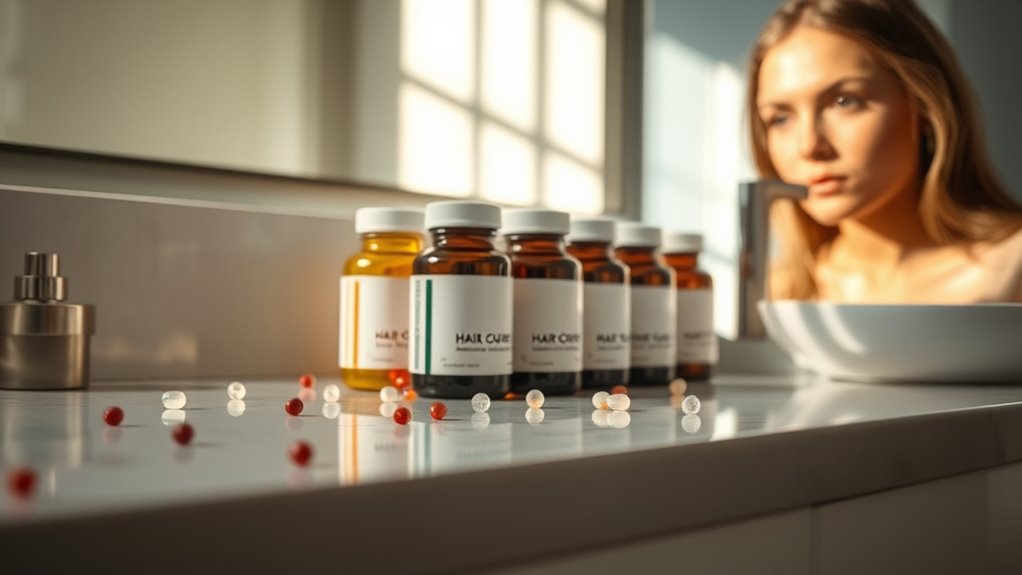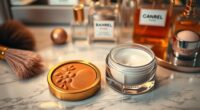The truth about hair growth supplements is that many hide dangers you might not see, like unregulated ingredients, contamination risks, and exaggerated claims. While they often contain vitamins and herbs marketed as miracle fixes, their safety and effectiveness are rarely proven. Excessive doses can cause serious health issues, and proprietary blends may hide unsafe substances. If you want to protect your health and get honest advice, there’s more you should know.
Key Takeaways
- Many hair supplements lack scientific proof of effectiveness and rely on marketing rather than proven benefits.
- The industry often lacks regulation, leading to unsafe ingredients, contamination, and unverified health claims.
- Proprietary blends hide ingredient amounts, increasing risks of overdose and adverse effects.
- Common ingredients like biotin can interfere with lab tests, causing misdiagnoses or false results.
- Transparency and third-party testing are crucial for safety but are often missing in many products.
What Are Hair Growth Supplements and How Are They Marketed?

Hair growth supplements are products designed to enhance hair thickness and fullness by providing vitamins, minerals, and plant extracts. These are often marketed as hair loss supplements that can reverse thinning, boost hair density, and improve overall hair health. Marketing strategies focus on natural, herbal, or exotic ingredients like biotin, saw palmetto, collagen, and horsetail to attract consumers seeking safe, effective options. Many of these supplements are sold over-the-counter online or in stores with minimal regulation, relying heavily on testimonials and before-and-after photos. Despite the bold claims, scientific evidence supporting their effectiveness is limited. The industry promotes these products as quick fixes, but it’s essential to remember that the ingredients in hair supplements aren’t always backed by rigorous research. Additionally, vetted formulations and safety standards vary widely across products, making it important for consumers to exercise caution. Recognizing the regulatory landscape of dietary supplements can help consumers make more informed choices. Moreover, understanding the cybersecurity aspects related to online purchases and reviews can protect consumers from scams and counterfeit products. Consumers should also be aware of scientific validation when evaluating the claims made by these products to avoid falling for misleading marketing tactics.
The Lack of FDA Oversight and Its Implications

Because dietary supplements are classified as foods rather than medications, they don’t require FDA approval before hitting the market. This lack of regulatory oversight means the FDA doesn’t rigorously evaluate the safety or efficacy of hair supplements before sale. Manufacturers can put ingredients on labels without proving they work or confirming their safety, which raises concerns about contamination and ingredient accuracy. Labeling regulations are lax, often omitting warnings about pregnancy risks, drug interactions, or lab test interference. As a result, you’re vulnerable to unproven or potentially unsafe products. Without proper oversight, harmful ingredients can slip through, and quality standards vary widely. This environment leaves consumers at risk, as the FDA isn’t actively monitoring or verifying the safety and ingredients of these supplements before they reach your hands. Additionally, the absence of rigorous risk assessment means potential dangers are often overlooked until adverse effects emerge. The lack of quality control further exacerbates these concerns, making it difficult for consumers to ensure they’re purchasing safe, effective products. Moreover, the inconsistency in manufacturing practices can lead to significant variations in supplement potency and purity. Without testing standards, the reliability of ingredient concentrations and purity remains uncertain, increasing the potential for harmful contamination or ineffective formulations. Furthermore, the absence of strict regulatory standards allows some manufacturers to make exaggerated or unsubstantiated claims about their products.
Do Ingredients in Supplements Really Promote Hair Growth?
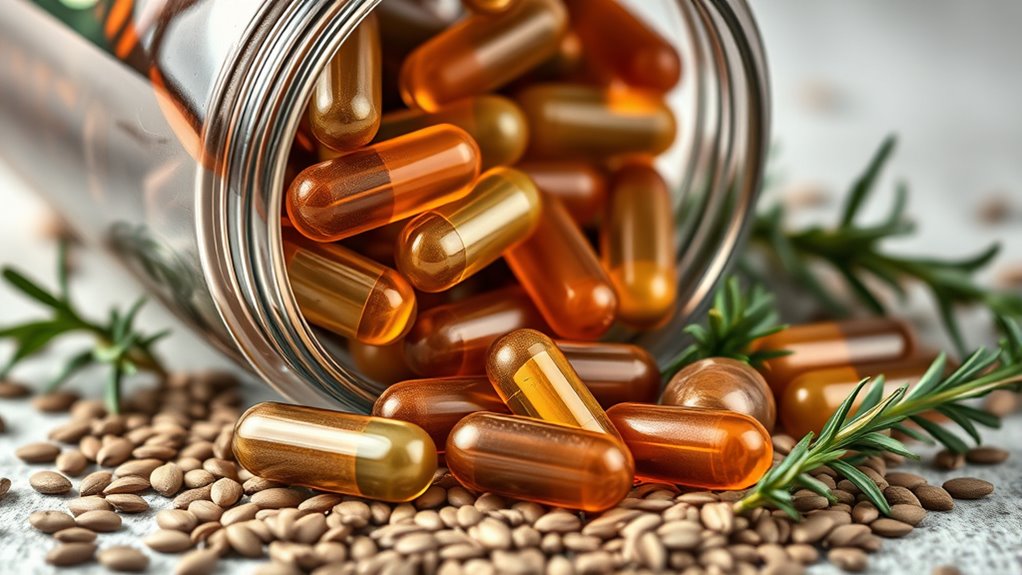
Many hair growth supplements include ingredients like biotin and saw palmetto, but scientific proof they actually work is limited. You should be aware that studies supporting these claims often lack independence and may be biased. Plus, some ingredients can cause side effects or interfere with tests, so safety is a real concern. Additionally, the effectiveness of these supplements remains unproven, raising questions about their true benefits for hair growth. Moreover, consistent creative practice can help individuals better understand their body’s responses and optimize their supplement routines for safety and effectiveness. It is also important to consider that some ingredients may impact overall air quality, which can indirectly influence scalp health and hair growth. Exploring how exfoliation benefits improve skin and scalp conditions can further clarify their role in supporting healthier hair. Furthermore, understanding the dog names popular among pet owners can provide insights into naming trends and cultural influences that shape our choices.
Limited Scientific Evidence Exists
While numerous hair growth supplements claim to boost hair regrowth, scientific evidence supporting these claims remains limited. Most ingredients, like biotin and vitamins, lack conclusive scientific evidence proving their efficacy for individuals with normal nutrient levels. Many studies are conducted in deficiency states or animal models, not in well-controlled human trials, leaving their real benefit uncertain. Peer-reviewed research supporting supplement ingredients is often funded by companies with vested interests, raising concerns about bias and reliability. Additionally, regulatory agencies like the FDA do not require rigorous testing for safety and efficacy before products hit the market. As a result, many supplements lack high-quality evidence, making it difficult to determine if they truly promote hair growth or are just marketing claims. Moreover, the lack of an established scientific consensus further complicates understanding their true effectiveness. It is also important to consider that consumer skepticism is often warranted given the limited regulation and oversight in the supplement industry. There is also a notable absence of comprehensive clinical trials evaluating long-term safety and results. Furthermore, the industry’s marketing tactics often exaggerate benefits without substantial scientific backing. A clear understanding of ingredient mechanisms is crucial for assessing their potential benefits and limitations.
Risks and Contaminants Present
Despite the limited scientific evidence supporting their effectiveness, hair growth supplements are widely used, raising concerns about safety and quality. Many products contain undisclosed ingredients or proprietary blends, increasing the risk of contaminants and adulterants that can harm you. Studies show that about 20% of dietary supplements, including hair products, are contaminated with heavy metals, bacteria, fungi, or prescription drug adulterants. Ingredients like biotin are often overrepresented but can interfere with lab tests, leading to misdiagnoses. Some marketed ingredients, such as shark cartilage or oyster extract, lack rigorous safety testing and may contain harmful contaminants or allergens. Without strict regulation, the quality, purity, and accuracy of ingredients vary widely, making contamination and adulteration a significant concern for consumers. Additionally, the presence of unverified ingredient claims can mislead consumers into believing in their efficacy without proper evidence.
The Risks of Excessive Vitamin and Mineral Doses

Taking excessive amounts of vitamins or minerals can lead to serious health problems, including toxicity and increased disease risk. You might also develop a false sense of security, thinking more is better, but overdose can do more harm than good. It’s important to stick to recommended doses to protect your health and avoid unintended consequences.
Toxicity From Overdose
Consuming excessive amounts of vitamins and minerals can pose serious health risks, even if these nutrients are essential for growth and well-being. Overdose from supplements can lead to toxicity and harmful side effects. Be cautious with high doses, as they can cause:
- Vitamin A and E toxicity, resulting in nausea, dizziness, and liver damage.
- Selenium overdose, which increases the risk of diabetes, hair loss, and brittleness.
- Excess biotin, interfering with lab tests and producing false results.
- High doses of zinc or iron, causing nausea, vomiting, and immune suppression.
Long-term intake of too much vitamin A beyond safe levels can also lead to fractures and birth defects. Always follow recommended dosages to avoid these dangerous health effects.
Increased Health Risks
Exceeding recommended doses of vitamins and minerals can substantially increase your health risks. Taking too much vitamin A, vitamin E, or biotin can lead to toxicity, with side effects like nausea, dizziness, and skin rashes. High selenium intake beyond 400 micrograms daily raises the risk of diabetes, hair loss, and even higher mortality. Overdoing zinc and iron supplements can cause gastrointestinal issues, interfere with nutrient absorption, and lead to toxicity. Consuming excessive vitamin A during pregnancy significantly heightens the chances of birth defects, especially above 10,000 IU daily. Large mineral doses can cause serious health problems like kidney damage, neurological issues, and increased cancer risk. In short, too much of these vitamins and minerals can do more harm than good, risking your health and hair.
False Sense of Security
Many people believe that more vitamins and minerals will boost their hair growth, but this can create a false sense of security. Overdoing it with hair supplements can lead to vitamin overdose and toxicity, risking your health. Here’s what you should know:
- Excessive vitamin A (over 10,000 IU/day) may cause birth defects and health issues, especially during pregnancy.
- High selenium intake (e.g., 300 µg/day over years) has been linked to increased mortality and diabetes risk.
- Biotin doses above 5 mg daily can interfere with lab tests, leading to misdiagnoses.
- Long-term high doses of vitamin E and B6 increase bleeding risks and nerve damage.
Chasing big nutrient doses might seem beneficial, but it often results in harmful side effects without proven benefits.
Hidden Dangers of Proprietary Blends and Contamination

Proprietary blends in hair supplements often hide the exact amounts and sources of ingredients, making it hard for you to judge their safety and effectiveness. Without transparency, you risk contamination from heavy metals, pesticides, or bacteria that can be present in unverified ingredients. These undisclosed contaminants pose serious health risks, especially if the supplement isn’t third-party tested. Some proprietary formulas even include undisclosed prescription drugs or harmful substances, increasing the danger without your knowledge. While third-party testing can help verify ingredient safety and purity, not all products undergo such scrutiny. This lack of transparency means you’re left in the dark about what’s really in your supplement, leaving your health vulnerable to hidden dangers that could outweigh any potential benefits.
Special Concerns for Pregnant Women and Potential Birth Defects

Pregnant women need to be especially cautious with hair growth supplements, as some ingredients can pose serious risks to fetal development. Excessive vitamin A intake, especially over 10,000 IU daily before week 7, can cause birth defects. Many supplements contain ingredients like saw palmetto or biotin without FDA pregnancy warnings, increasing the risk of unintentional fetal exposure to harmful substances. Additionally, 5-alpha reductase inhibitors, found in some products, are linked to abnormal male genitalia and are classified as pregnancy category X drugs. Too much selenium (e.g., 300 µg/day) during pregnancy has been associated with gestational diabetes and adverse fetal outcomes. Since most hair supplements lack rigorous safety testing in pregnant women, the potential for birth defects and developmental issues remains largely unknown.
- Excess vitamin A can cause birth defects.
- Unlabeled ingredients pose risks.
- Category X drugs threaten fetal health.
- Over-supplementation increases complication risks.
How Ingredient Interference Can Skew Laboratory Test Results
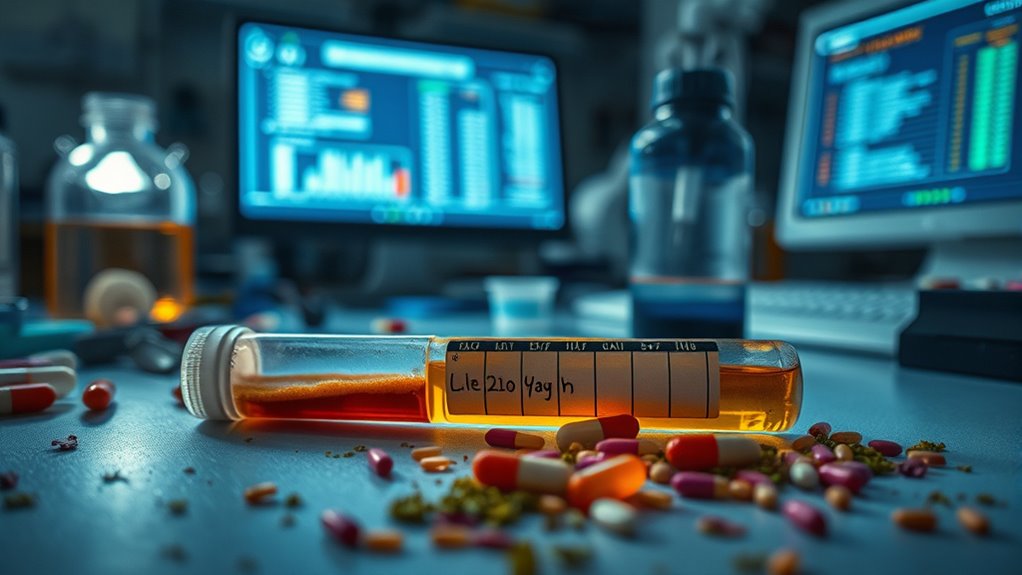
Ingredient interference from supplements like biotin can markedly distort laboratory test results, leading to misdiagnoses or missed diagnoses. High-dose biotin, often found in hair growth supplements, can cause lab interference, especially in tests measuring hormone levels, troponin, or other critical markers. The FDA warned in 2017 that biotin levels above 10,000 mcg can substantially alter test outcomes, making results unreliable. Many supplement ingredients aren’t listed clearly on labels, so you might unknowingly skew your lab results. This interference can result in false positives or negatives, affecting diagnoses of thyroid disorders, heart attacks, or other conditions. To ensure accurate readings, healthcare providers often advise stopping certain supplements days before blood tests, highlighting the impact supplement ingredients can have on diagnostic accuracy.
The Challenges of Verifying Supplement Quality and Safety

Verifying the quality and safety of dietary supplements is inherently challenging because they are not subject to FDA pre-market approval. This lack of oversight makes it difficult to guarantee supplement safety before products reach you. Consider these obstacles:
- Contamination risks from bacteria, heavy metals, or prescription drug adulterants due to inconsistent manufacturing practices.
- The prevalence of mislabeled ingredients, which can mislead consumers and compromise safety.
- Proprietary blends that obscure ingredient quantities and sources, complicating safety assessments.
- Limited third-party certification, leaving many products unchecked by independent organizations like NSF or USP.
Without strict regulation, you face increased exposure to unsafe or contaminated supplements, making it essential to scrutinize manufacturing practices and look for third-party verification whenever possible.
Making Informed Choices: What Consumers Need to Know
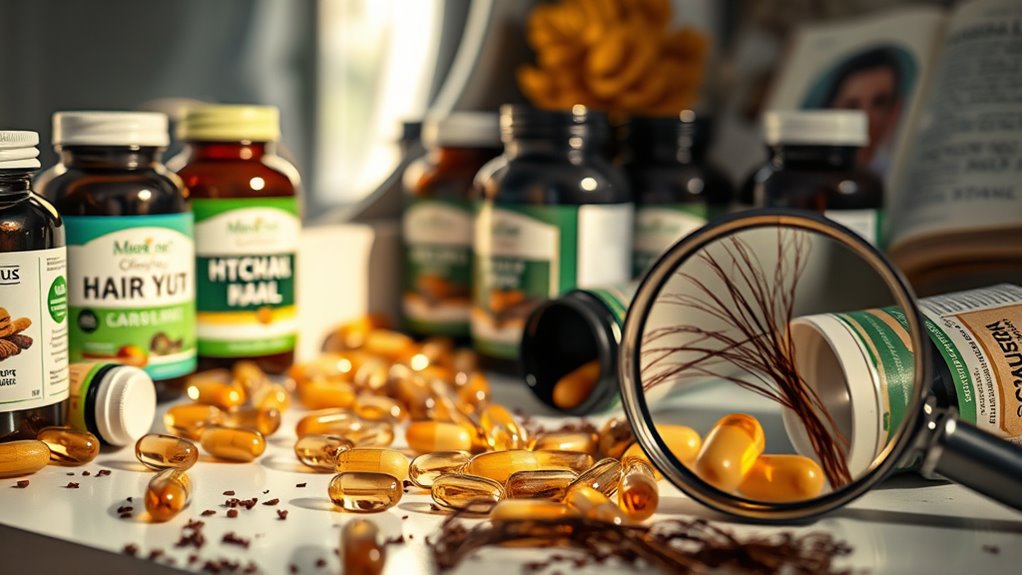
Making informed choices about hair growth supplements requires careful scrutiny of product labels and an understanding of what to look for. Check for ingredient transparency, avoiding proprietary blends that hide ingredient quantities and sources, which makes evaluating safety difficult. Always consult healthcare providers and consider blood tests for deficiencies like iron or vitamin D before starting any supplement. Rely on independent research and third-party certifications, since much evidence for these products is funded by manufacturers and may be biased. Be aware of potential health risks, such as nutrient overdoses or interference with lab tests, especially with ingredients like biotin. Remember, supplements are unregulated by the FDA, so prioritizing transparency, clear ingredient disclosure, and reputable certifications helps you make safer, smarter choices.
Frequently Asked Questions
What Is the Truth About Hair Growth Supplements?
You might think hair growth supplements are a quick fix, but the truth is, they often aren’t proven to work. Many aren’t regulated, so their safety and effectiveness aren’t guaranteed. High doses of vitamins can even cause health issues or interfere with tests. Instead of relying on supplements, focus on a balanced diet, proper hair care, and consult a healthcare professional for personalized advice.
Are There Any Proven Hair Growth Supplements?
You might wonder if any hair growth supplements are proven effective. Currently, no supplements have FDA approval or solid scientific proof for hair regrowth in the general population. While some like Nutrafol and Viviscal show promise in small studies, they lack rigorous validation. For proven results, it’s best to consult healthcare professionals and consider evidence-based treatments like minoxidil or finasteride rather than relying solely on over-the-counter supplements.
Are There Any Dangers in Taking Nutrafol?
You might face dangers with Nutrafol, especially if you have underlying health conditions or take medications. It contains high doses of biotin and vitamins that can skew lab results, leading to misdiagnoses. There’s also a risk of allergic reactions from ingredients like saw palmetto or plant extracts. Since Nutrafol isn’t FDA-regulated, its safety and purity aren’t guaranteed. Always talk to your healthcare provider before starting it, especially if you’re pregnant, nursing, or on medication.
Is There Anything That Really Works for Hair Growth?
Imagine your hair as a garden needing the right nutrients to flourish. While some treatments like minoxidil and finasteride have solid scientific backing, over-the-counter supplements often lack proof. You might wish they worked, but the truth is, proven options are more reliable. Focus on dermatologist-approved treatments and a healthy diet to truly nurture your hair’s growth, rather than relying solely on unverified supplements.
Conclusion
While hair growth supplements might seem like a simple solution, there’s a subtle dance of risks and benefits behind the scenes. By staying informed and cautious, you can navigate this industry’s gentle whispers and make choices that truly serve your well-being. Remember, sometimes the best beauty secrets come from patience and care, not just quick fixes. Trust your instincts and prioritize safety—your hair and health deserve nothing less.
